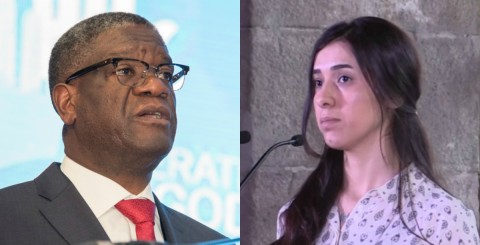Denis Mukwege and Nadia Murad, advocates for women harmed by war, win Nobel Peace Prize
The Congolese Christian surgeon and Yazidi activist have seen each of their homelands devastated by violence.

Denis Mukwege, a Congolese Christian surgeon, and Nadia Murad, a Yazidi human rights activist, were honored with the 2018 Nobel Peace Prize “for their efforts to end the use of sexual violence as a weapon of war and armed conflict.”
The Nobel Committee announced the recipients in October; the prize will be given in December.
Mukwege—who founded Panzi Hospital in Bukavu, the Democratic Republic of the Congo, for sexual assault survivors—gave the keynote address at the 2017 assembly of the Lutheran World Federation in Windhoek, Namibia. He told the assembly about accompanying his father on pastoral visits to people who were ill and finding his own vocation in medicine.
During the ongoing conflict in the DRC, he has treated thousands of victims of a campaign of rape—part of what he has called an economic war motivated by a desire to control land and resources. More than 6 million Congolese have died in the conflict.
Read our latest issue or browse back issues.
In addition to providing medical care, he has spoken out on behalf of women who have suffered sexual violence, and he has been part of efforts to assist survivors through economic self-sufficiency programs, cases in the legal system, and moral and psychological support.
“The root of sexual violence is to be found above all in the teaching in our churches that despises women,” he said at the LWF assembly. “Certain theologies have reduced women to the role of ‘reproducers’ in the service of men. It is clear that there is a link between this misogyny, this teaching that despises women, supported by false theologies, and the sexual violence to which women are subjected whether in times of peace or times of war.”
Murad is one of those women, having suffered under the military campaign by the self-described Islamic State against Yazidis and other religious minorities.
She was 21 when the IS army attacked her village in northern Iraq in 2014. She and thousands of other women in the Sinjar region were beaten, raped, and taken prisoner. More than 3,000 Yazidi women are still captive, and 300,000 are living in camps for internally displaced people.
Since Murad escaped with the help of a family in Mosul, she has testified about her ordeal and advocated for other survivors of sexual violence and human trafficking through the organization she founded, Nadia’s Initiative.
“I share this award with Yazidis, Iraqis, Kurds, other persecuted minorities and all of the countless victims of sexual violence around the world,” she said in a statement.
In a press conference, Murad called for an international effort with the “participation of victims themselves to bring back life to regions destroyed by war.” She also invited all governments to join her in working to end genocide and sexual violence.
“My hope is that all women who speak about their experience of sexual violence are heard and accepted,” she said.
A version of this article appears in the print edition under the title “People: Denis Mukwege and Nadia Murad.”





